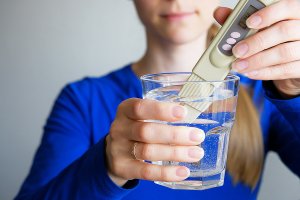Benefits of Drinking Alkaline Water

The pH levels of water are a result of the minerals inside. Alkaline water undergoes an ionization process that provides a pH level greater than seven. Thus, it boasts a neutral pH level because it exceeds the acid range.
Media and marketing has attributed alkaline water with many positive benefits thanks to its supposed detoxifying effect. These theories claim that it can even prevent certain diseases such as cancer. But, is it true?
Claimed benefits of alkaline water
Supporters of alkaline water say that it helps the body eliminate acidic waste. As a result, it plays an important role in homeostasis, correcting and regulating the acid-base balance.
In addition, they also state that the water is an antioxidant as well and reduces the production of free radicals while promoting cellular regeneration. According to those claims, drinking alkaline water regularly would help to prevent signs of aging.
Lastly, supporters also say that the water helps fight against osteoporosis. Eliminating acidic residue means eliminating acidic uric acid and other components through urine. In turn, it helps to prevent osteoporosis while eliminating calcium that’s trapped in the acidic residues.

The evidence, or lack of evidence, behind the claims
In recent scientific literature, there are no supporting studies proving the health benefits of alkaline water. Furthermore, some investigators might recommend not drinking it regularly because of its high content in certain minerals.
But, there are certain types of light mineral water that can have benefits for problems such as kidney stones. However, these benefits don’t come from the pH levels; instead, they result from the presence of certain minerals.
On another note, alkaline water does hold scientific weight for other functions. Drinking it can help fight against acid reflux thanks to its neutralizing effects.
The water can instantly neutralize pepsin, deactivating its effects. As a result, acid reflux sufferers can experience quick relief.
Making alkaline water
Making alkaline water at home is quite simple. An easy recipe is boiling water then letting it cool afterward. Or, you can add a tablespoon of baking soda to a glass of water.
Both methods will give you water with a pH level that’s greater than 7.3, which is the minimum required level to be considered as alkaline.
Drinkable water
Whether alkaline water actually offers health benefits of not, everyone should agree that consuming drinkable water is crucial. Many water supplies worldwide still contain micro-organisms or aren’t treated altogether. Unsafe water sources increase the risks of suffering from many gastrointestinal diseases.
You should make sure that the water you consume is treated properly. While bottled water is a safe product, it isn’t always the case with tap water.

If you’ve ever had doubts about a certain source, you’re better off not drinking it. Save yourself from risky toxins and infections.
Benefits of alkaline water: conclusion
Studies haven’t proved more health benefits of alkaline water aside from fighting stomach acid and acid reflux. Again, this is thanks to the neutralizing quality it has against pepsin and stomach acids. In any case, there’s no supporting evidence behind antioxidant benefits or preventing cancer.
Furthermore, drinking it regularly isn’t recommendable due to its high mineral content. Drinking normal, safe water, however, is essential for a healthy lifestyle.
Bottled water is a safe option that can help keep you healthy. Adding on, avoid drinking from public fountains or from the tap if you have doubts about the quality.
The pH levels of water are a result of the minerals inside. Alkaline water undergoes an ionization process that provides a pH level greater than seven. Thus, it boasts a neutral pH level because it exceeds the acid range.
Media and marketing has attributed alkaline water with many positive benefits thanks to its supposed detoxifying effect. These theories claim that it can even prevent certain diseases such as cancer. But, is it true?
Claimed benefits of alkaline water
Supporters of alkaline water say that it helps the body eliminate acidic waste. As a result, it plays an important role in homeostasis, correcting and regulating the acid-base balance.
In addition, they also state that the water is an antioxidant as well and reduces the production of free radicals while promoting cellular regeneration. According to those claims, drinking alkaline water regularly would help to prevent signs of aging.
Lastly, supporters also say that the water helps fight against osteoporosis. Eliminating acidic residue means eliminating acidic uric acid and other components through urine. In turn, it helps to prevent osteoporosis while eliminating calcium that’s trapped in the acidic residues.

The evidence, or lack of evidence, behind the claims
In recent scientific literature, there are no supporting studies proving the health benefits of alkaline water. Furthermore, some investigators might recommend not drinking it regularly because of its high content in certain minerals.
But, there are certain types of light mineral water that can have benefits for problems such as kidney stones. However, these benefits don’t come from the pH levels; instead, they result from the presence of certain minerals.
On another note, alkaline water does hold scientific weight for other functions. Drinking it can help fight against acid reflux thanks to its neutralizing effects.
The water can instantly neutralize pepsin, deactivating its effects. As a result, acid reflux sufferers can experience quick relief.
Making alkaline water
Making alkaline water at home is quite simple. An easy recipe is boiling water then letting it cool afterward. Or, you can add a tablespoon of baking soda to a glass of water.
Both methods will give you water with a pH level that’s greater than 7.3, which is the minimum required level to be considered as alkaline.
Drinkable water
Whether alkaline water actually offers health benefits of not, everyone should agree that consuming drinkable water is crucial. Many water supplies worldwide still contain micro-organisms or aren’t treated altogether. Unsafe water sources increase the risks of suffering from many gastrointestinal diseases.
You should make sure that the water you consume is treated properly. While bottled water is a safe product, it isn’t always the case with tap water.

If you’ve ever had doubts about a certain source, you’re better off not drinking it. Save yourself from risky toxins and infections.
Benefits of alkaline water: conclusion
Studies haven’t proved more health benefits of alkaline water aside from fighting stomach acid and acid reflux. Again, this is thanks to the neutralizing quality it has against pepsin and stomach acids. In any case, there’s no supporting evidence behind antioxidant benefits or preventing cancer.
Furthermore, drinking it regularly isn’t recommendable due to its high mineral content. Drinking normal, safe water, however, is essential for a healthy lifestyle.
Bottled water is a safe option that can help keep you healthy. Adding on, avoid drinking from public fountains or from the tap if you have doubts about the quality.
All cited sources were thoroughly reviewed by our team to ensure their quality, reliability, currency, and validity. The bibliography of this article was considered reliable and of academic or scientific accuracy.
- Koufman JA., Johnston N., Potential benefits of pH 8.8 alkaline drinking wáter as an adjunct in the treatment of reflux disease. Ann Otol Rhinol Laryngol, 2012. 121 (7): 431-4.
- Bylund J., Toljander J., Lysèn M., Rasti N., Enggvist J., Simonsson M., Measuring sporadic gastrointestinal illness associated with drinking water – an overview of methodologies. J Water Health, 2017. 15 (3): 321 – 340.
This text is provided for informational purposes only and does not replace consultation with a professional. If in doubt, consult your specialist.








